The question remains open, but we can observe more and more luxury establishments adopting sustainable commitments. Motivated by the demand of many tourists wishing to reduce their ecological footprint or suffering from eco-anxiety, hoteliers are positioning themselves in this niche, including in the luxury sector. Indeed, for the past few years, thanks to media coverage of the issue and collective awareness, tourists have developed a desire for "green" tourism.
How are these luxury hotels doing it? What actions are they implementing? Explanations.
>> Download your white paper "2025 Hotel Trends - What to Expect?"
I. ECO-RESPONSIBLE TOURISM, A TREND OF RECENT YEARS
You've probably heard about it in recent years, and even more so since the crisis: eco-responsible tourism is THE future of the industry!
1. What is eco-responsible tourism?
Eco-tourism supports two fundamental principles of sustainable development:1. As the name suggests, eco-responsible tourists now travel with minimal impact on the environment and support biodiversity protection;
2. Eco-responsible travelers also have a significant impact on the economy and local culture. At their level, they support poverty reduction.
The trend is towards nature preservation, sharing, respect for encountered populations, rather than mass tourism and organized tours. These principles bring a sustainable and ethical dimension to tourism.
And within this greener and more sustainable type of tourism, there are different forms of travel. Here are a few:
- Ethical or solidarity tourism: an increasing number of trips are offered to support local populations, humanitarian efforts, etc. Providers of this type of travel directly reinvest a portion of the trip price into local development (countries in South America, Africa, etc.).
- Eco-tourism: these are trips taken in nature, which contribute to biodiversity protection. It's important to note that this is not the same as "green" tourism, which characterizes more urban stays.
- .Green tourism: these are stays in urban establishments that aim to reduce their carbon footprint by implementing temperature or electricity regulation solutions, or partnerships with local producers for fresh food offerings, for example.
- Slow tourism: the new star of sustainable travel, "slow tourism" is a format where travelers take their time (transportation, cultural discovery, meeting local populations). Beyond a travel format, slow living is a mindset; we'll delve into this later.
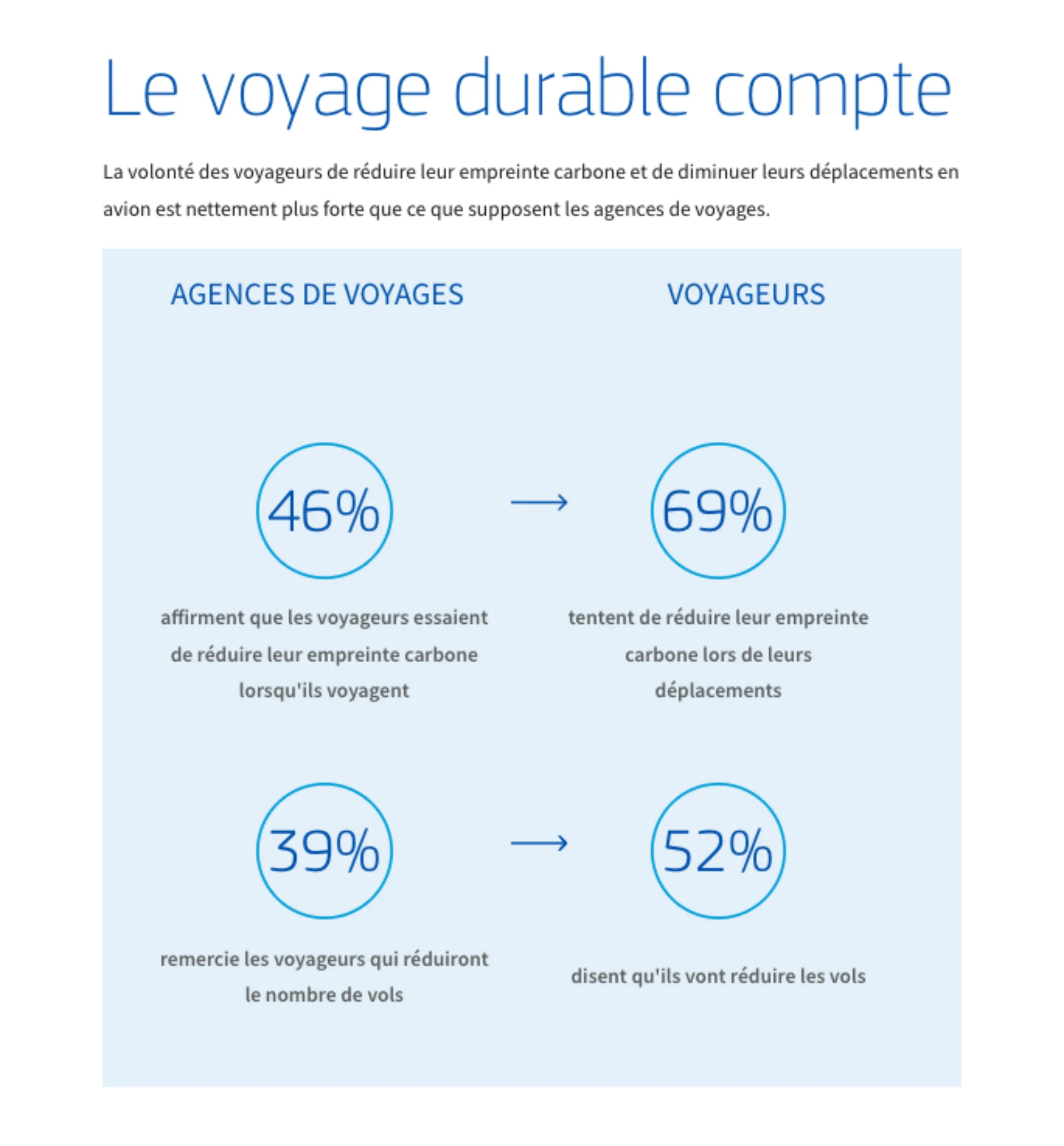
2. What motivates these new eco-travelers?
Tourism is an industry where influence is increasingly significant. Influencers, bloggers, YouTubers, journalists for travel magazines: many of them take us on their adventures through their stories, vlogs, features, articles... Thus, eco-tourism has not escaped this influence; it has been at the center of attention for tourists and dreamers who follow these personalities.
But while some are familiar with this type of travel, it still remains minimal.
A study conducted by Amadeus reports that "60% of French travelers are concerned about the environmental footprint of their travels, and more than a third of French travelers lament a lack of information provided by travel agencies on the subject."
Another study conducted by Travelzoo indicates that in terms of transportation, "38% of French travelers mainly prefer 'local travel' and avoid long-distance journeys." On-site, nearly a third travel by bike or public transportation. And we know that transportation has the greatest impact on carbon footprint! Faced with the climate emergency, movements to boycott air travel are attracting more and more people.
But air transport is not the only one under scrutiny! Today, tourists also want to consume better during their travels; they want to buy local to prioritize short supply chains.
The third motivation for practicing eco-tourism: discovering preserved nature (with information on fauna and flora). And for this, there's no need to go to the jungle or the savannah; France is full of breathtaking natural landscapes!
Thus, French and foreign tourists alike are eager to reduce their ecological footprint by opting for sustainable tourism. Some will prioritize a hotel that adopts an eco-responsible approach: for example, the Yooma hotel in the 15th arrondissement of Paris, which uses organic and locally sourced products grown on its own roof for its menus, rather than a typical hotel in the capital.
And this approach doesn't just involve actions; it's also a mindset, like slow tourism.
3. Focus on slow tourism
Appearing in the 2000s, slow tourism has resurfaced, especially since the crisis. With the evolution of consciousness and behavior, the slow tourism trend is constantly increasing.
This alternative form of tourism allows for a combination of respect for nature and the environment, preservation of local resources, all while maintaining the passion and love for travel.
As the name suggests, slow tourism is about taking one's time to travel, especially through transportation means such as walking, cycling, or hiking, to discover nature and landscapes while enjoying every moment. All of this is done with a serene and tranquil mindset! Ideal for disconnecting and experiencing a more intense stay.
The principles of slow tourism include:
- Visiting less crowded destinations
- Meeting locals, engaging in discussions, and exchanging experiences
- Taking it easy and not rushing, hence making choices about the places one wants to see
- Consuming locally in terms of accommodation, food, and activities.
But let's return to our initial question!
II. LUXURY AND ECO-TOURISM, DO THEY MATCH?
To answer the question, let's revisit the definition of luxury hospitality.When we say that a hotel is luxurious, we are referring to:
- The establishment itself (hotels in the high-end, very high-end segments, starting from 5 stars and palaces).
- The quality and personalization of service: indeed, the clientele of luxury hotels is looking for personalized service that meets their expectations and impeccable quality. Employees in high-end hotels know their customers perfectly, from their names to their consumption habits and preferences.
However, it is impossible to have a single definition of luxury hospitality.
Luxury is also a sector in constant evolution. A luxury hotel is not the same as it was 10 years ago, or even 5 years ago. While some continue to assert their palace status in their communication (sometimes excessively), other hotels opt for "less is more" and are more discreet about their luxury positioning.
In the past, luxury hotels were associated with noble materials (marbles and impressive chandeliers), but today the trend is towards hyper-personalization.
Customers are looking for a unique, rare, and exclusive experience, such as traveling to very remote, wild, and culturally rich places; this is the new luxury!
It is on this point that high-end establishments can find synergy with sustainable tourism!
Indeed, the wealthiest clients have also become aware of the climate urgency and are looking for justifications and commitments from hotels where they stay. They want to meet local populations, consume locally. Often criticized for staying in hotel complexes where ecology is not a priority, they now want to adopt a more sustainable behavior.
1. Certifying a sustainable hotel through labels
If luxury hotels take sustainable measures to attract a new clientele, they also do so to adapt to ecological charters and eco-labels, which have become essential for their images today.
For about a decade now, 4-5 star hotels and palaces have been riding the trend and aiming to obtain labels (Green Key, Green Globe, European Ecolabel, etc.) certifying their eco-responsible programs.
And it has been a real challenge for them!
Because the fear of wanting to contribute to climate change without sacrificing the requirements and comfort of luxury clientele was very strong!
But today, many hotels have succeeded in the challenge and have changed their attributes and behavior: larger green spaces, fresh food prepared with local products, efforts in waste management, less plastic, activities to connect with nature or recycled materials...
Obviously, some clients will not embrace this new luxury and will not be able to sacrifice staying in their favorite palace.
And while some will be willing to travel the world again, clients most affected by flight shaming prefer short-haul trips and local vacations. That's why luxury eco-hotels are increasingly developing, especially in France.
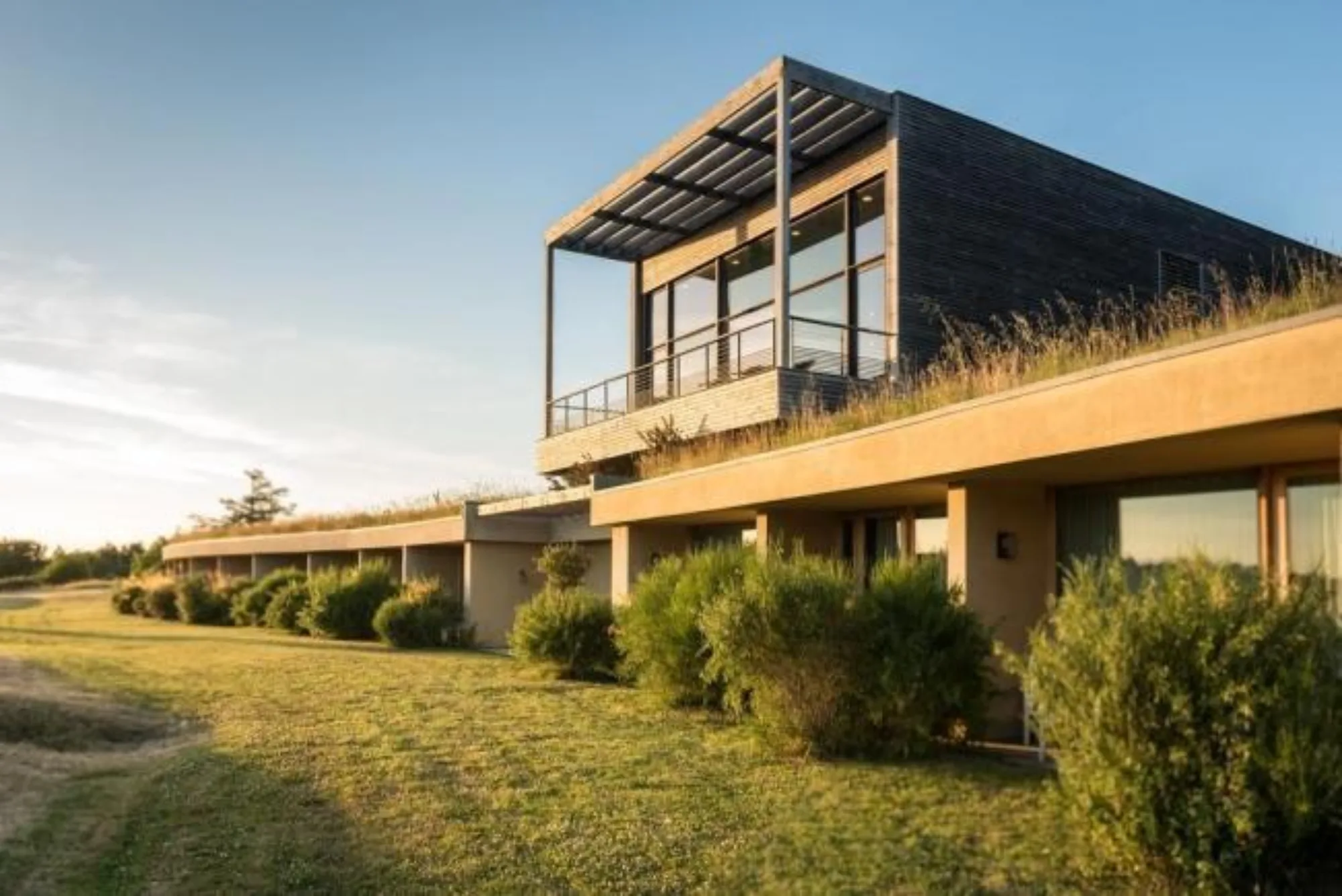
2. 3 Examples of Luxury Eco-Hotels!
One of the pioneers in eco-tourism in France is Yves Rocher.
Passionate about botany and faithful to its brand commitments, in 2009, he embarked on and developed an eco-hotel, specifically a beauty farm. And this, in his hometown of Morbihan, without the sea nearby, without monuments, and without museums. Just a village of a few hundred inhabitants.
However, La Grée des Landes is now a recognized domain oriented towards nature: it is located amidst meadows, its roof is covered with wild herbs allowing for natural temperature regulation.
Hotel guests can engage in various wellness activities such as Yogi Walki, which combines walking with sports, enjoy the eco-spa, or relax by the pool surrounded by green walls. The restaurant menus are made with 100% organic and local products. A success in eco-hotels.
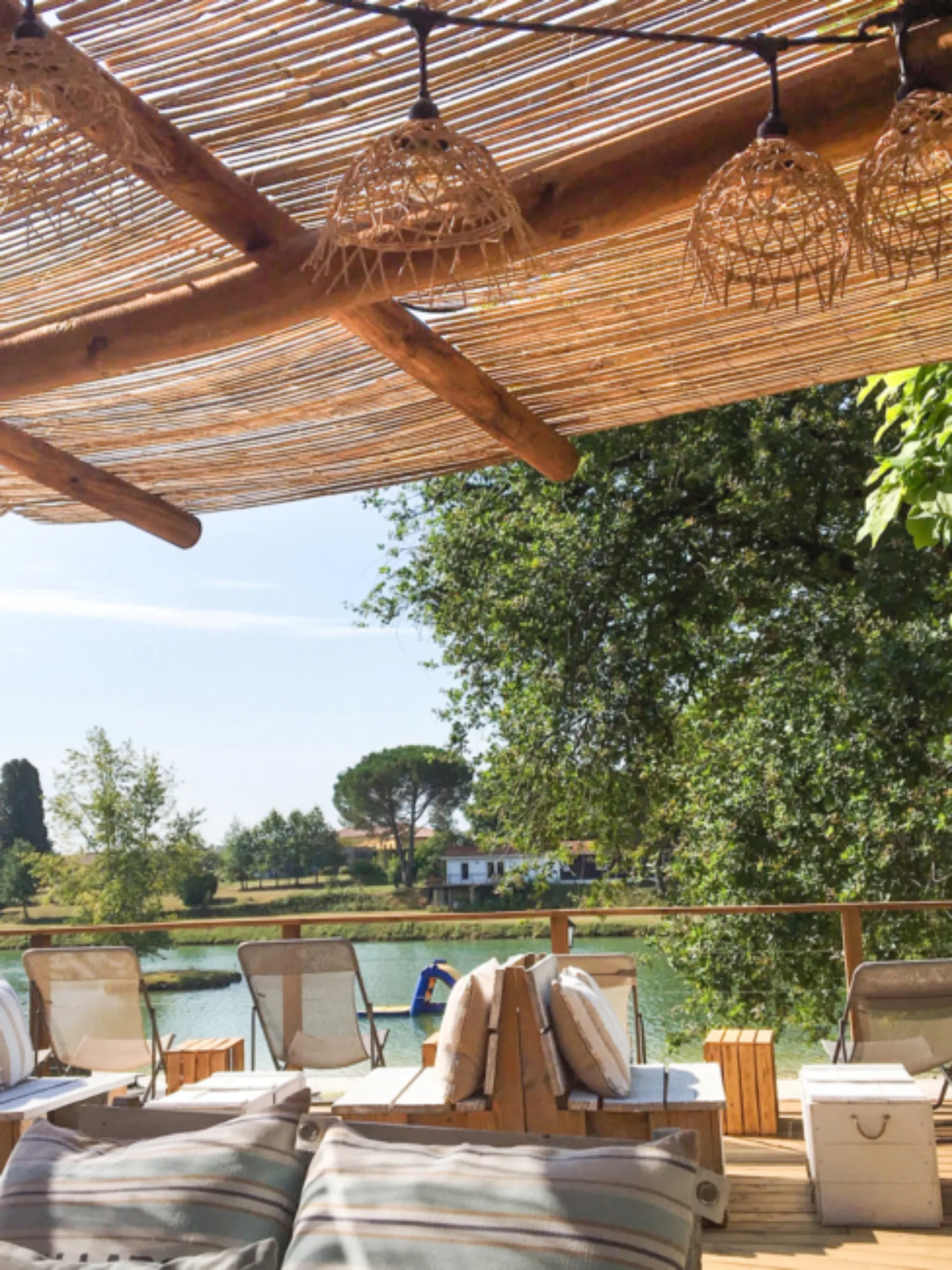
More recently, another player has taken up the challenge: the Whaka Lodge resort.
Founded by a couple passionate about travel and exotic islands, this 12-hectare estate incorporates the codes of resorts located in exotic and paradisiacal destinations and applies them to a more natural setting: the Gers region.
They have imagined a trendy eco-resort ideal for lovers who do not want or cannot travel to the other side of the world. This chic and natural estate will allow them to unwind and enjoy peaceful vacations.
Surrounded by forests, a white sand beach with a lake for swimming, Whaka Lodge offers activities such as kayaking, paddleboarding, yoga, tennis, a library, and a "food & wine" bar featuring products from local producers.
Guests can savor every moment to experience true slow tourism! And for those who cannot completely disconnect, Whaka Lodge even offers a "telecommuting" rental kit: a pod coffee machine, printer, and desk for telecommuting by the lake!
Finally, how can we not mention the Hôtel Fleur de Loire *****, by the double-starred chef Christophe Hay?
This "Relais & Châteaux" hotel with 44 rooms, two gourmet restaurants, a pastry kiosk, Sisley spa, pool, and one-and-a-half-hectare vegetable garden, was conceived and designed with an eco-responsible approach.
A considerable challenge as the building in which the establishment is located dates back to the 17th century. It was therefore necessary to renovate it and ensure compliance with the standards of the place. "To meet the values of the project, the chef imagined a closed-water circuit air conditioning system to avoid electrical losses and the use of energy-consuming heat pumps. External heating and air conditioning systems were banned from the project. In order to collect rainwater, two water pockets are located in reserves in the cellar and will water the gardens of Fleur de Loire. All light bulbs are LEDs, and the building's energy comes entirely from wind power," reads an interview with Nouvelles Gastronomiques.
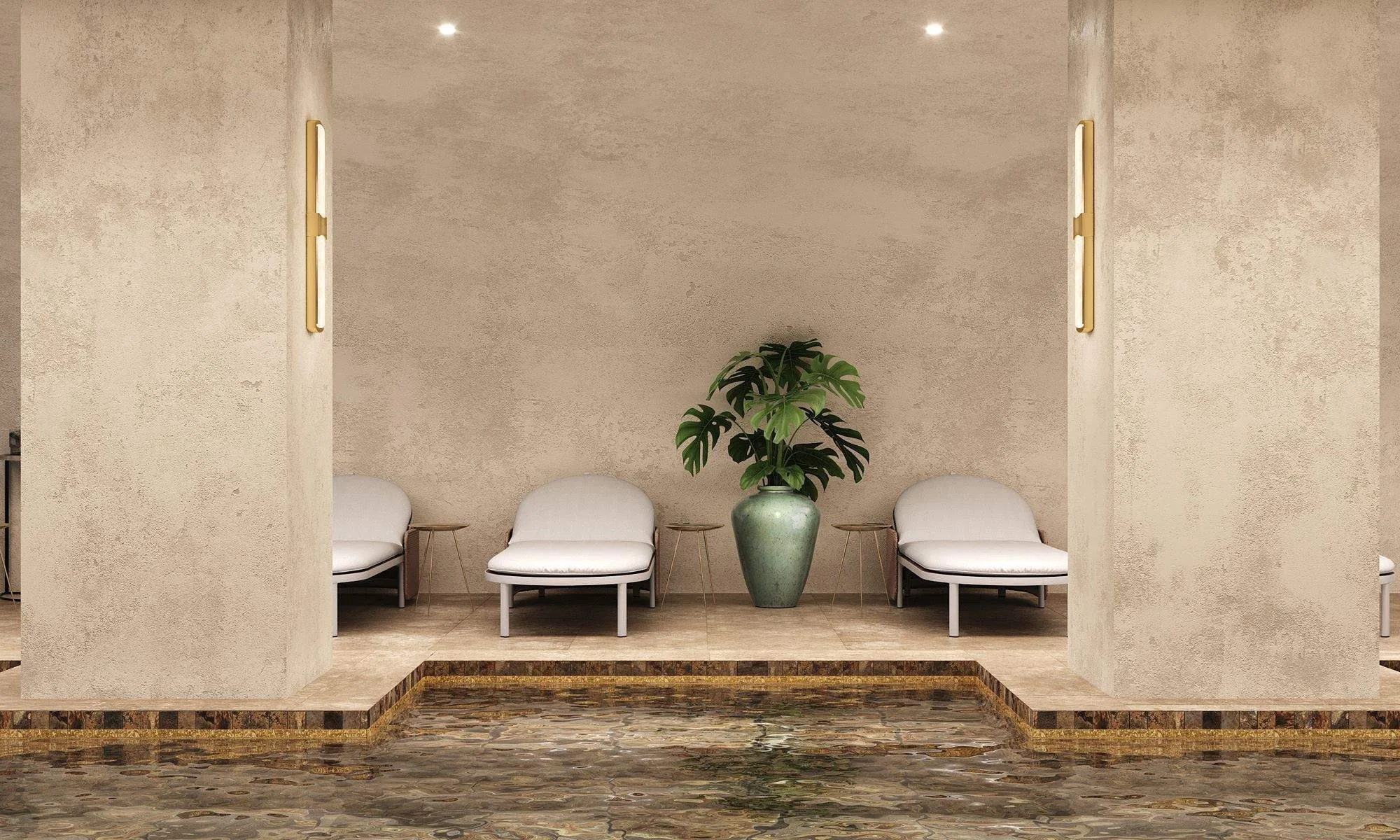
And the sustainable actions don't stop there.
In the rooms, guest amenities are replaced by dispensers. All of the hotel's furniture is made of wood from sustainably managed forests that benefit from an ecological label (FSC or PEFC). The room keys are also made of wood to avoid disposable cards and limit plastic usage. The room directory is digitized to avoid paper waste. And the soaps are made by a local soap factory.
The outdoor spaces are also utilized. The gardens have been designed as an extension of the Loire River. To be self-sufficient in fruit and vegetable supply, the chef has invested in 1.5 hectares of land around the building.
With Fleur de Loire, Christophe Hay embodies commitment, with a focus on sustainability, proximity, as well as on the well-being at work and the quality of life of his teams.
III. Putting your hotel in the green: what actions to take to embark on eco-tourism?
Convinced? Do you also want to take the leap and offer a renewal to your establishment? Let's review the actions and commitments that luxury hotels take to have a more ecological approach.
1. A greener approach... through commitments
To obtain labels and certifications, luxury hotels implement sustainable commitments, particularly to preserve the environment.
Electricity produced by photovoltaic panels, options for collective transportation, waste collection systems, rainwater harvesting, home automation systems regulating energy consumption, rooftop gardens or beehives... All these initiatives have a positive impact on the environment.
In countries with limited resources, natural and wild landscapes are sometimes threatened by local populations (poaching, agriculture...). These paradisiacal landscapes are gradually losing their charm. Plants and animal species are threatened. Luxury hotels established in these areas (South Africa, Kenya, South America, Malaysia, Thailand...) fight against this and aim to preserve fauna and flora.
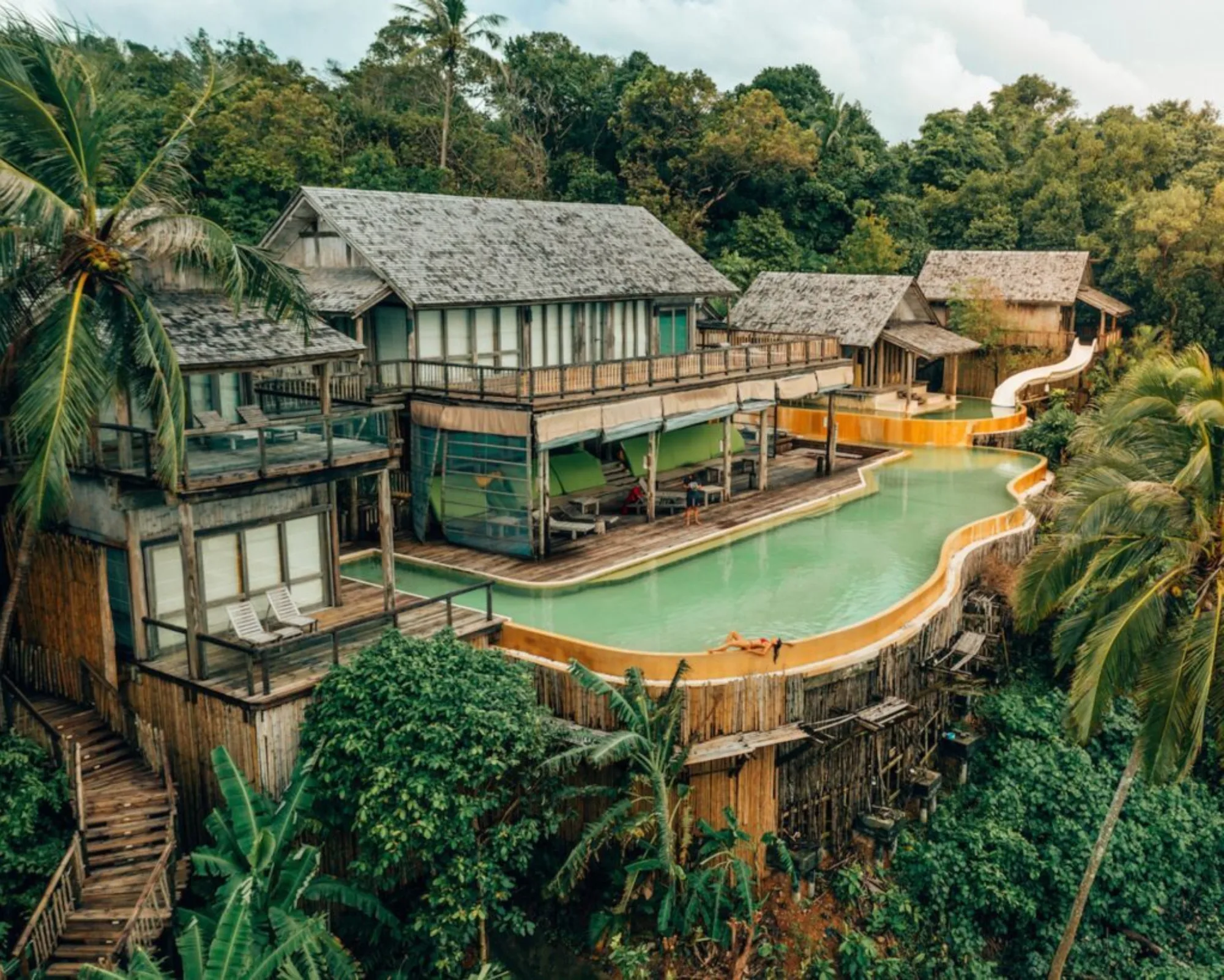
The Soneva Kiri Resort in Thailand grows its own fruits, but most importantly, they have decided not to offer wakeboarding, jet skiing, or any other motorized activities.
To offer authentic experiences to their clients, luxury hotels are willing to pay fees for the use of national parks or premiums to establish themselves in natural reserves. Thus, environmental protection is more sustainable, and the land is not degraded.
In terms of food, clients are seeking fresh, natural, and local products. This is a boon for local producers, who will see increased demand.
The commitments of luxury hotels not only have positive impacts on the environment but also on local economies. Clients want to interact with locals. They want to discover local and traditional culture: customs, food, artisanal activities...
This presents opportunities for local populations. They can work in hotels as managers, receptionists, or tour guides...
Luxury hotels can also commit to helping local communities by training them in the tourism industry (hotel professions, management, marketing, language...) This way, people with little education can acquire skills that will make it easier for them to find employment.
Eco-resorts and sustainable tourism providers can also support local projects, such as schools, nearby agriculture fields, hospitals, or clinics...
The inhabitants of these communities will be aware of the need to preserve their heritage and be proud of their culture. This is especially true for the younger generation, who will be encouraged to keep their customs alive and reconnect with their roots.
2. A greener approach... through technology
Luxury hotels are increasingly adopting digital solutions that allow them to communicate better with their clients, offer entertainment, and also manage their processes more effectively internally.
This use of technology can also contribute to reducing expenses and energy consumption.
Home automation, for example, allows hotel guests to regulate the temperature of their room, lighting, blinds, etc. All of this significantly reduces the hotel's energy expenses and has a positive impact on the establishment's carbon footprint.
Digital solutions like the Bowo Guest App promote good practices aimed at improving behaviors and reducing consumption.
Less paper
No more paper check-in forms, guides, or room directories! All hotel information is now digitized within the web app.
More well-being at work
Through digitized processes offered by a technological solution like Bowo, employees spend less time on time-consuming and unfulfilling tasks and feel more valued. Thus, working conditions are improved, and employees are more likely to stay longer in the establishment.
Thus, the use of a web app or technological solution can significantly reduce energy consumption. This is a boon for hotels looking to adopt more sustainable practices!
>> Read our article "What actions to take to address the labor shortage during the recovery?"
Conclusion: Yes, luxury hospitality and eco-tourism are compatible!
Similar articles
